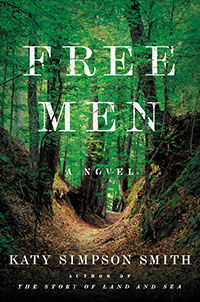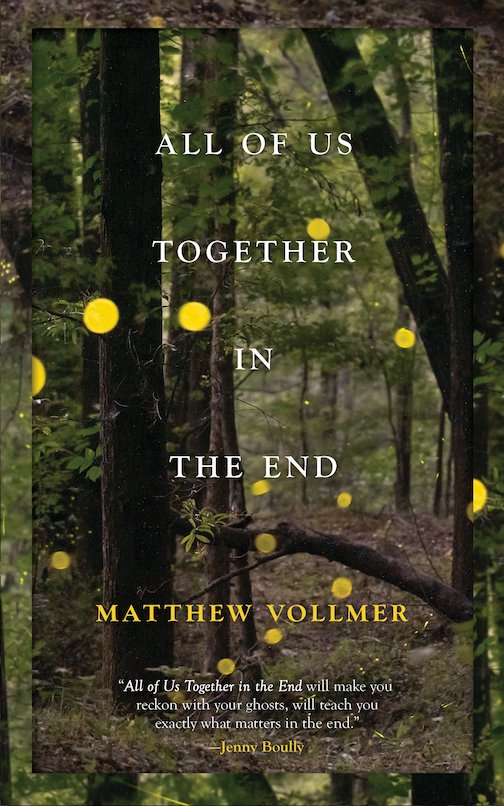Men of Diverse Character
In Katy Simpson Smith’s Free Men, three uncommon bandits commit a violent crime in the wilds of eighteenth-century Alabama
Set in late-eighteenth-century America, Katy Simpson Smith’s Free Men ponders the question of human identity. Are the inhabitants of this unfamiliar world a new breed of person, or are they men as men have always been, with predictable motivations and behavior, though propagated in the unfamiliar wilderness that is the newly United States?
 In 1788, in the forested wilds now known as Lower Alabama, three men—black, white, and Native American—travel together, heading west to the Mississippi River. They are suspected of having committed a violent crime, and Louis Le Clerc Milfort, a French tracker who has lived among the Creek Indians for many years, is sent to capture them. Le Clerc is an able tracker, but his heart’s work is anthropology. As he follows these three through the woods, he makes notes: “I already picture the treatise this will make: three men of diverse but foul character have forged a union out of mutual greed … and have thereby revealed the various motives that make the American backcountry a landscape of merciless individual pursuit.” For what else would cause these three to travel together in the first place, much less remain together, after committing such a crime? Le Clerc, for all his experience in examining other cultures, believes all men are at heart the same sort of creature. “Give me your actions for a day,” he challenges, “and I can find the thoughts to match them.” The trio’s very existence, unlikely as it is, irresistibly compels him, for he “yearns to be surprised.”
In 1788, in the forested wilds now known as Lower Alabama, three men—black, white, and Native American—travel together, heading west to the Mississippi River. They are suspected of having committed a violent crime, and Louis Le Clerc Milfort, a French tracker who has lived among the Creek Indians for many years, is sent to capture them. Le Clerc is an able tracker, but his heart’s work is anthropology. As he follows these three through the woods, he makes notes: “I already picture the treatise this will make: three men of diverse but foul character have forged a union out of mutual greed … and have thereby revealed the various motives that make the American backcountry a landscape of merciless individual pursuit.” For what else would cause these three to travel together in the first place, much less remain together, after committing such a crime? Le Clerc, for all his experience in examining other cultures, believes all men are at heart the same sort of creature. “Give me your actions for a day,” he challenges, “and I can find the thoughts to match them.” The trio’s very existence, unlikely as it is, irresistibly compels him, for he “yearns to be surprised.”
Smith fills in the personal history of her characters through shifting first-person narration. Bob, a runaway slave, is buoyed by a natural cheer that even a life in bondage can’t entirely diminish. When the despair of captivity finally overcomes him, he begins to plan his escape. (Later in the novel he testily explains why it took him so long to run: “When you’re in a life, all you do is live it. You don’t make decisions every damn day.”) He wants to forge a new life west of the Mississippi, to work a farm like the one his older brother Primus used to make up stories about. “The stories were what reminded us that what seemed real was just a passing fancy; this bound land, our broken cabins, the way we couldn’t see our mother but at night, these were not all of what could happen. The best of life was not what we were living, but something already past, or up ahead.” Among Bob’s duties in servitude is making occasional runs to sell rum to neighboring Indian settlements. One day he leaves on a week-long trip with a plan never to return.
 Istillicha is a Creek Indian whose relationship with his family and tribe is fraught. He’s a member of the ruling family and potential heir to the chief, but his childhood is marked by violence. After a terrible betrayal by someone very close to him, he leaves his tribe and sets off on his own into the wild woods.
Istillicha is a Creek Indian whose relationship with his family and tribe is fraught. He’s a member of the ruling family and potential heir to the chief, but his childhood is marked by violence. After a terrible betrayal by someone very close to him, he leaves his tribe and sets off on his own into the wild woods.
Cat, a poor white man, is unkempt and starving when Bob wakes up one morning to find Cat holding a knife to his throat. Despite this first encounter, Cat’s demeanor is so vulnerable and needy that Bob struggles to make sense of his own instinct to nurture rather than fear his new companion. They meet Istillicha shortly afterward and journey as a trio toward a violent misadventure in the woods.
The heart of this quietly graceful and lushly-written novel is Cat. His narration recalls Faulkner in its acrobatic use of metaphor and the earthy, visceral near-poetry with which he describes his life and world. His hardscrabble and heartbreaking childhood doesn’t callous over his affection-starved tenderness. In one of the novel’s more beautiful passages, Cat observes that “there were soft apple spots in my father. He took me once in spring to where the flowers grew. So many trees, it was hard to find the space to bloom. But in the meadow they spread wide. Between eating berries he wove a crown for me, clever knotted in thistle. I wore it and saw my joy in the dirty smudge of his face, and we were boys at play in a field.”
Le Clerc reemerges as narrator many times throughout the novel, and it is his gaze through which the reader traces the grim reality of the crime these characters have committed. Le Clerc also asks the more interesting questions of American identity and the human soul; as the novel unfolds, the odyssey of Bob, Cat, and Istillicha becomes a fascinating metaphor for the sort of organic multiculturalism that the United States has embodied since its inception. After several days of tracking, Le Clerc reflects, “I trail them, every hour less like a pursuer and more like a pilgrim. I can no longer justify my delay in seizing them unless I admit to myself that here before me is everything I once believed to be a dream. Three men, none alike, asking to see each other, to be seen. Each pursuing a wild fancy that only this country, with all its contradictions, can permit.”
After all, a person’s race, or his social or legal status, is murky—if not irrelevant—when meeting as strangers in the wilderness. It’s an apt metaphor for the American origin story. These men—free for the time being—have a chance to author their own destinies.

Kathryn Justice Leache is a freelance writer who lives with her family in her hometown of Memphis. Her life among books has included work as a librarian and stints as a bookseller at Square Books in Oxford, Mississippi, and The Booksellers at Laurelwood in Memphis.


